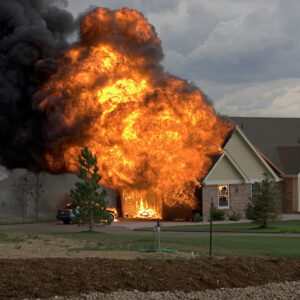Are you more likely to find a four-leaf clover or experience a home fire? In response to a 2020 American Red Cross Home Fire Safety Survey, most people selected the clover.
However, chances are much higher (1 in 380) that you’ll experience a home fire at some point in your life as opposed to a 1 in 10,000 chance at finding the elusive clover. The Red Cross works with families like yours every day to help ensure your safety is not left to chance.
Home fires are the nation’s most frequent disaster, tragically taking seven lives every day in the U.S. And because cooking and heating are the two leading causes, home fires become even more frequent as the weather gets colder. In the Delaware Valley, the Red Cross responds to 25 percent more home fires in November through March than in warmer months, with responses nearly doubling between October and January.
In November alone, Red Cross disaster volunteers responded to more than 40 home fires in Southeastern Pennsylvania, providing 242 people with urgent needs like emergency lodging, financial assistance, emotional support and recovery planning. Providing this type of recovery support is essential to our mission, but helping families prepare for and avoid disasters is equally as urgent.
The Red Cross has important information and tips to help keep your family safe this holiday season and throughout the year.
Stay warm, cozy and safe
Our 2020 survey showed that more than half of us have used a space heater — a piece of equipment that is involved in most fatal home heating fires. If you must use a space heater, be sure to provide at least three feet of empty space and it, and never leave space heaters unattended. Follow these additional tips:
- Place your space heater on a hard and nonflammable surface, such as a ceramic tile floor, and not on rugs and carpets or near bedding and drapes. Plug space heater power cords directly into outlets, never into an extension cord, and turn it off every time you leave the room or go to sleep.
- Never, under any circumstances, use a cooking range or oven to heat your home.
- Never leave a fire burning in the fireplace unattended. Make sure any embers in the fireplace are extinguished before going to bed or leaving home. Use a glass or metal fire screen to keep embers in the fireplace.
Deck your halls safely
Candles are very popular, especially around the holidays, so it makes sense that December is the peak month for home candle fires. Candles cause about 20 home fires a day in the U.S. If you’re decorating with candles this holiday season, consider using the battery-operated kind. If you must use flame candles, keep them away from anything that can burn, and place them out of reach of pets and children. Most importantly, never leave burning candles unattended. Take these additional steps to deck your halls safely:
- Check all holiday light cords to ensure they aren’t frayed or broken. Don’t string too many strands of lights together (no more than three per extension cord) and turn off all holiday lights when going to bed or leaving the house.
- If you buy artificial tree, look for the fire-resistant label, and put it up away from fireplaces, radiators and other sources of heat. Never use electric lights on metallic trees. If you get a live tree, make sure it’s fresh and keep it watered. To test if the tree is fresh, bend the needles up and down to make sure no needles fall off.
- Don’t light the fireplace if you have stockings or other decorations handing your mantle.
Keep an eye on what you fry
Many of us do extra cooking during the holiday season. Cooking is the top cause of all reported home fires in the U.S. The easiest way to prevent kitchen fires is to keep an eye on what you fry, that is, never leave cooking food unattended. If you need to leave the kitchen, even for a moment, turn off the stove. Here’s some additional tips:
- Move items that can burn, like dishtowels, bags, boxes, paper and curtains, away from the stove, and keep children and pets at least three feet away.
- Keep a pan lid or a cookie sheet nearby and use them to cover a pan if it catches on fire. If a fire starts in your oven, keep the door shut.
- Use a timer to remind yourself that the stove or oven is on, and check the kitchen before going to bed to ensure all stoves, ovens and small appliances are turned off.
Every second counts when there’s a home fire. Escaping in less than two minutes can be the difference between survival and tragedy. And testing your smoke alarms every month and practicing your escape plan with your entire family – including children and pets – at least twice per year can cut the risk of dying in a home fire by half. Together, we can end home fires.
Follow us on social media: Twitter: @DV_Journal or Facebook.com/DelawareValleyJournal


